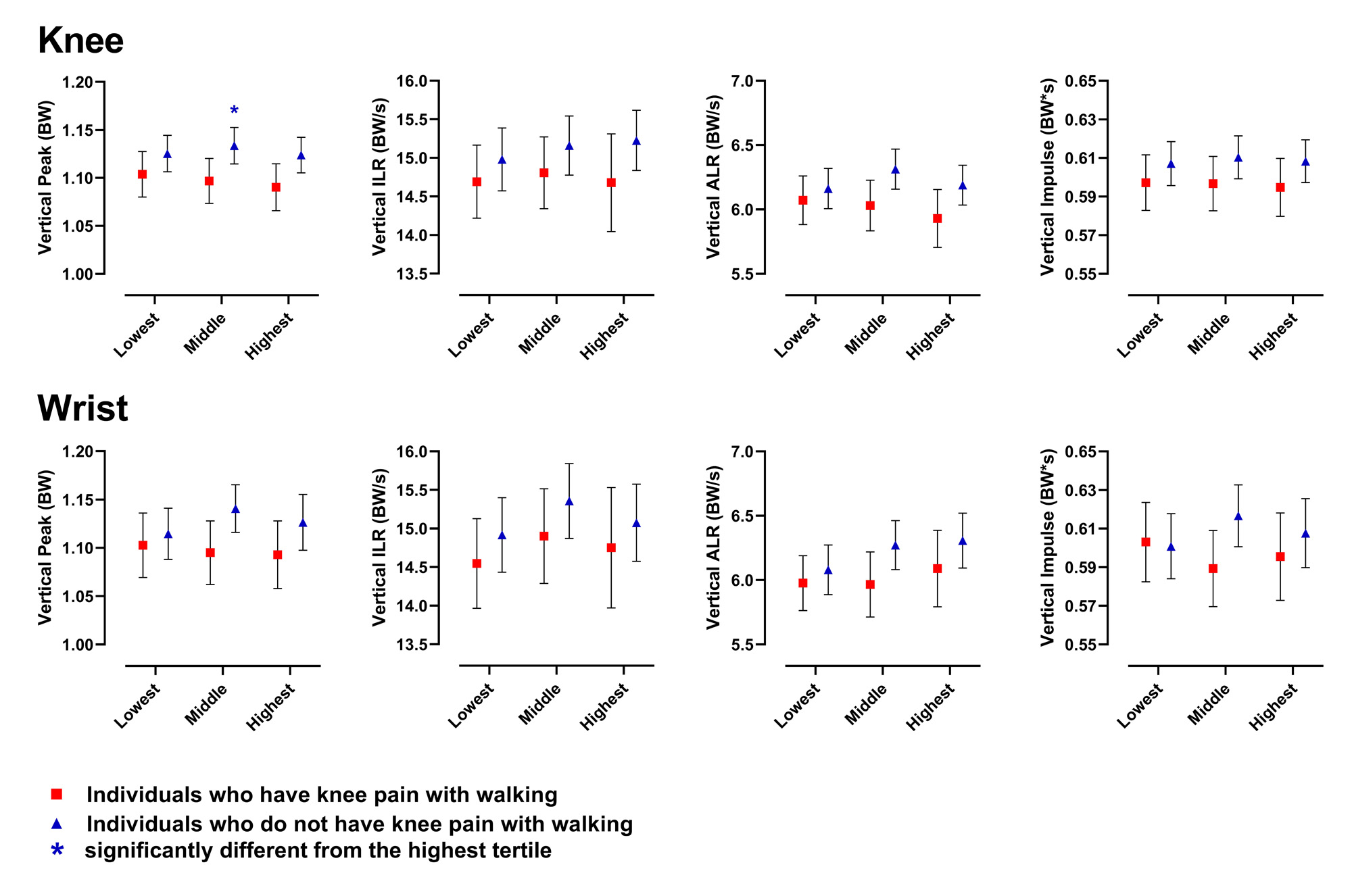Session Information
Session Type: Abstract Session
Session Time: 4:00PM-5:30PM
Background/Purpose: Knee osteoarthritis (KOA) is a leading cause of pain and disability worldwide with no definitive treatment. There is a need to identify mechanisms that explain KOA progression so that targeted treatments can be developed. Increased forces while walking are associated with structural progression of KOA. Altered nociceptive signaling, a feature of KOA, could partially explain forces while walking. In this study, we aimed to characterize the relation of pain sensitization to ground reaction forces during walking. We hypothesized that lower pressure pain thresholds (PPTs) (i.e., greater sensitization) would be associated with decreased vertical ground reaction forces (vGRF) in those with and without knee pain while walking.
Methods: We used data from the 12-year visit of the Multicenter Osteoarthritis (MOST) Study. MOST is a NIH-funded, prospective, cohort study of >3000 persons with or without KOA.
PPTs were assessed at the right wrist (unless contraindicated) and both patellae. For each trial, a hand-held pressure algometer with a 1 cm2 tip was used to apply pressure at a rate of 0.5 kg/s. Pressure was recorded when pain was first perceived. PPTs for each anatomic site were determined as the average of three trials. Sex-specific tertiles were used to categorize PPTs because of known sex differences.
Three-dimensional force data were sampled (1000 Hz) while participants walked at a self-selected speed. With vGRF waveforms, we determined peak force, peak instantaneous loading rate (ILR), and average loading rate (ALR) during the first half of stance, as well as total impulse during stance (i.e., time integral). All vGRF metrics were averaged across at least 3 gait trials for each limb and normalized to body weight.
Generalized linear models, with generalized estimating equations to account for the correlation between limbs, characterized relations of PPT tertiles to vGRF metrics. Person-level covariates included age, sex, and race. Limb-level covariates included KOA status (Kellgren-Lawrence ≥2), knee pain severity (VAS; 0-100), and gait speed. For each vGRF metric, adjusted means and 95% confidence intervals were determined for each PPT tertile after stratifying by knee pain with walking. Knee pain was defined as at least mild pain in response to the question “how much pain do you have in your (right/left) knee while walking on a flat surface?”
Results: 1944 MOST participants (57% female; 19% non-white; 38% with at least mild knee pain with walking), with a mean (SD) age of 62.4 (9.8) years and BMI of 29.9 (5.3) kg/m2, were included. Of the 3399 limbs, 26% had KOA, and average walking speed and VAS were 1.31 (0.23) m/s and 12 (17), respectively.
All vGRF metrics are reported in Figure 1 by PPT tertile for those with and without knee pain with walking. Only the vGRF peak forces were significantly different between the middle and highest PPT knee tertiles; no other vGRF metrics differed across PPT tertiles. All vGRF metrics were numerically lower in those with knee pain with walking compared to those without knee pain with walking.
Conclusion: Pain sensitivity was not associated with limb-level loading in persons with or without knee pain during walking.
To cite this abstract in AMA style:
Corrigan P, Lewis C, Costello K, Kumar D, Felson D, Neogi T, Frey Law L, LaValley M, Nevitt M, Lewis B, Stefanik J. Relation of Pain Sensitivity to Forces While Walking in Adults with and Without Knee Pain: The Multicenter Osteoarthritis (MOST) Study [abstract]. Arthritis Rheumatol. 2023; 75 (suppl 9). https://acrabstracts.org/abstract/relation-of-pain-sensitivity-to-forces-while-walking-in-adults-with-and-without-knee-pain-the-multicenter-osteoarthritis-most-study/. Accessed .« Back to ACR Convergence 2023
ACR Meeting Abstracts - https://acrabstracts.org/abstract/relation-of-pain-sensitivity-to-forces-while-walking-in-adults-with-and-without-knee-pain-the-multicenter-osteoarthritis-most-study/

